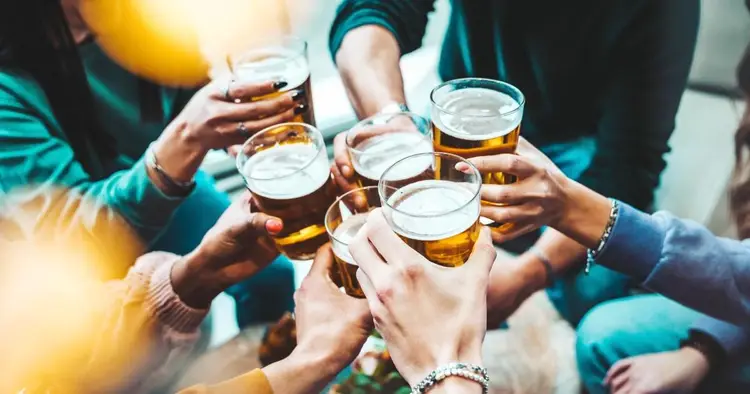Everything you need to know about the 'Ozempic for drinkers'

You’ve probably come across medications such as Ozempic and Wegovy, which are both designed for type 2 diabetes and weight loss, respectively.
Currently, a medication known as naltrexone – often dubbed the ‘Ozempic for drinkers’ – has become popular on social media and is receiving accolades for its ability to assist individuals who have difficulty managing their alcohol intake.
Why has it been referred to as the 'Ozempic' of the alcohol industry?
Similar to the weight loss medication, it focuses on the brain's reward systems to lessen the urge to snack.
Ozempic helps people eat less by lowering their appetite, which can lead to weight loss. Meanwhile, naltrexone stops the enjoyable feelings that come from drinking alcohol, making people feel less inclined to have a drink.
Here’s a complete guide on the topic, covering its functioning and the process of how it’s prescribed.
Suzanne Wylie, a general practitioner and medical advisor for IQdoctor, explains to Metro that naltrexone is a drug that "functions by inhibiting the impact of opioids in the brain, which may help lessen the enjoyable sensations linked to alcohol consumption."
"This approach might assist those looking to cut back on their alcohol consumption or stop drinking altogether. When used as directed, naltrexone can lessen the craving for alcohol, making it simpler for people to stay committed to their recovery objectives," Suzanne notes.
While it has earned the casual nickname "Ozempic for drinkers," Suzanne emphasizes the need to clarify that these two medications have distinct functions.
Ozempic, which contains the active ingredient semaglutide, is mainly utilized for managing weight and controlling diabetes. On the other hand, naltrexone is a medication that blocks the effects of opioids and is often prescribed to help decrease cravings for alcohol and lower overall intake.
So, how does this approach assist individuals in lowering their alcohol intake? Dr. Deepali Misra-Sharp, who oversees programs for substance misuse and women's health, explains to Metro that it helps by easing cravings. Research indicates that it can decrease not only how often relapses occur but also their intensity, particularly for those who are dedicated to reducing or stopping their drinking.
Similarly, Dr. Deepali points out that by reducing the pleasure linked to alcohol, naltrexone helps increase the chances of staying sober.
The Risks Of Drinking Too Much Alcohol
Dr. Deepali highlights that one of the major risks of drinking too much alcohol is liver disease, which is primarily caused by heavy drinking in the UK.
"Many individuals don’t realize the harm they are causing to their liver since symptoms usually only emerge once the condition has advanced significantly," she comments.
Similarly, alcohol is recognized as a cancer-causing substance. According to Dr. Deepali in a conversation with Metro, it contributes to at least seven different types of cancer, such as breast, liver, mouth, and throat cancer.
Dr. Deepali points out that according to Cancer Research UK, the risk of developing cancer linked to alcohol begins with the very first drink, and there’s no amount of alcohol that can be considered completely safe when it comes to cancer risk.
In other contexts, drinking too much alcohol can harm heart health. However, when enjoyed in moderation, it can have positive effects on the heart.
Dr. Deepali explains that while moderate alcohol intake may offer certain benefits for heart health, drinking too much can raise blood pressure, significantly increasing the risk of stroke and heart disease.
Are There Other Treatments For Alcohol Use?
In addition to counseling and changes in lifestyle, there are medical options available to help manage heavy drinking, and naltrexone is just one of them. Suzanne points out that medications like acamprosate and disulfiram also function in a comparable manner.
The first approach aims to bring back the normal levels of neurotransmitters in the brain that are thrown off by alcohol, while the second approach triggers negative responses to alcohol, serving as a prevention measure against overindulgence.
"NHS Guidelines For Naltrexone Prescription"
Naltrexone has received approval for use on the NHS. As Dr. Deepali explains, it is prescribed by a general practitioner (GP), who evaluates a patient's alcohol consumption and decides if this treatment is suitable for them.
They can also recommend a specialized alcohol treatment service that may incorporate psychological support in addition to medication.
Dr. Deepali explains that these treatment methods tend to be most effective when they are paired with continuous support, adjustments to one's lifestyle, and therapies customized to fit each person's unique needs.
If you're looking to gain a better insight into your drinking habits, you can reach out to Drinkaware by clicking here.
Do you have an experience you'd like to talk about?
Reach out by sending an email to [email protected].
MORE: Almost 10 million pounds of meat have been recalled from frozen meals and salads.
MORE: I contracted dengue fever while traveling with a backpack, and here's why I felt like I was on the brink of death.
MORE: Landlord continues to demand an outrageous price for half pints, even two years after instituting a ban on them.
Subscribe to our newsletter for the latest happenings in London, reliable reviews, fantastic deals, and exciting contests. Get the highlights of London delivered straight to your inbox!
This website is secured by reCAPTCHA, and the Google Privacy Policy and Terms of Service are in effect.









































